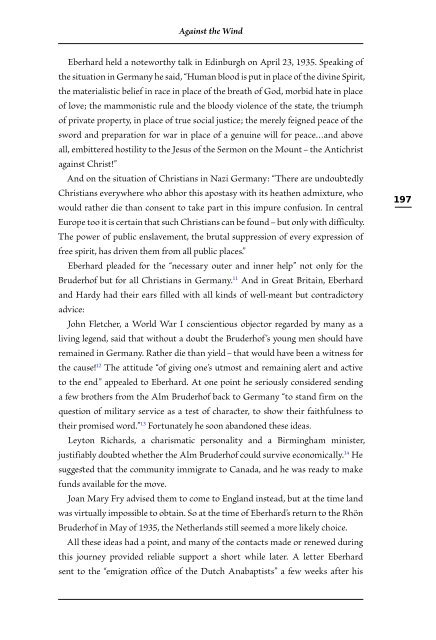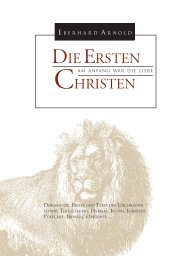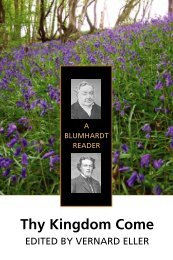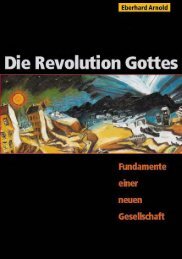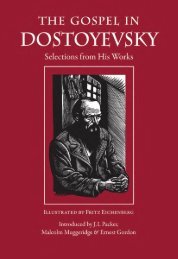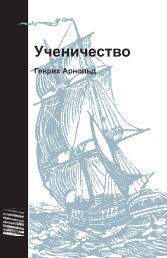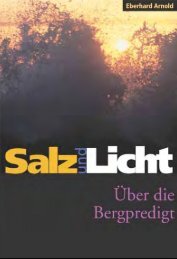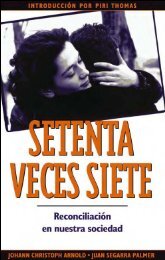Against the Wind: Eberhard Arnold and the Bruderhof - Plough
Against the Wind: Eberhard Arnold and the Bruderhof - Plough
Against the Wind: Eberhard Arnold and the Bruderhof - Plough
You also want an ePaper? Increase the reach of your titles
YUMPU automatically turns print PDFs into web optimized ePapers that Google loves.
<strong>Against</strong> <strong>the</strong> <strong>Wind</strong><strong>Eberhard</strong> held a noteworthy talk in Edinburgh on April 23, 1935. Speaking of<strong>the</strong> situation in Germany he said, “Human blood is put in place of <strong>the</strong> divine Spirit,<strong>the</strong> materialistic belief in race in place of <strong>the</strong> breath of God, morbid hate in placeof love; <strong>the</strong> mammonistic rule <strong>and</strong> <strong>the</strong> bloody violence of <strong>the</strong> state, <strong>the</strong> triumphof private property, in place of true social justice; <strong>the</strong> merely feigned peace of <strong>the</strong>sword <strong>and</strong> preparation for war in place of a genuine will for peace…<strong>and</strong> aboveall, embittered hostility to <strong>the</strong> Jesus of <strong>the</strong> Sermon on <strong>the</strong> Mount – <strong>the</strong> Antichristagainst Christ!”And on <strong>the</strong> situation of Christians in Nazi Germany: “There are undoubtedlyChristians everywhere who abhor this apostasy with its hea<strong>the</strong>n admixture, whowould ra<strong>the</strong>r die than consent to take part in this impure confusion. In centralEurope too it is certain that such Christians can be found – but only with difficulty.The power of public enslavement, <strong>the</strong> brutal suppression of every expression offree spirit, has driven <strong>the</strong>m from all public places.”<strong>Eberhard</strong> pleaded for <strong>the</strong> “necessary outer <strong>and</strong> inner help” not only for <strong>the</strong><strong>Bruderhof</strong> but for all Christians in Germany. 11 And in Great Britain, <strong>Eberhard</strong><strong>and</strong> Hardy had <strong>the</strong>ir ears filled with all kinds of well-meant but contradictoryadvice:John Fletcher, a World War I conscientious objector regarded by many as aliving legend, said that without a doubt <strong>the</strong> <strong>Bruderhof</strong> ’s young men should haveremained in Germany. Ra<strong>the</strong>r die than yield – that would have been a witness for<strong>the</strong> cause! 12 The attitude “of giving one’s utmost <strong>and</strong> remaining alert <strong>and</strong> activeto <strong>the</strong> end” appealed to <strong>Eberhard</strong>. At one point he seriously considered sendinga few bro<strong>the</strong>rs from <strong>the</strong> Alm <strong>Bruderhof</strong> back to Germany “to st<strong>and</strong> firm on <strong>the</strong>question of military service as a test of character, to show <strong>the</strong>ir faithfulness to<strong>the</strong>ir promised word.” 13 Fortunately he soon ab<strong>and</strong>oned <strong>the</strong>se ideas.Leyton Richards, a charismatic personality <strong>and</strong> a Birmingham minister,justifiably doubted whe<strong>the</strong>r <strong>the</strong> Alm <strong>Bruderhof</strong> could survive economically. 14 Hesuggesed that <strong>the</strong> community immigrate to Canada, <strong>and</strong> he was ready to makefunds available for <strong>the</strong> move.Joan Mary Fry advised <strong>the</strong>m to come to Engl<strong>and</strong> instead, but at <strong>the</strong> time l<strong>and</strong>was virtually impossible to obtain. So at <strong>the</strong> time of <strong>Eberhard</strong>’s return to <strong>the</strong> Rhön<strong>Bruderhof</strong> in May of 1935, <strong>the</strong> Ne<strong>the</strong>rl<strong>and</strong>s still seemed a more likely choice.All <strong>the</strong>se ideas had a point, <strong>and</strong> many of <strong>the</strong> contacts made or renewed duringthis journey provided reliable support a short while later. A letter <strong>Eberhard</strong>sent to <strong>the</strong> “emigration office of <strong>the</strong> Dutch Anabaptists” a few weeks after his197


